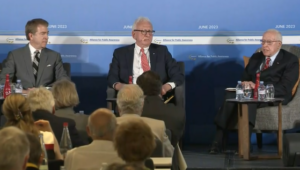The US policy on Iran and what the appropriate approach would be was the subject of a panel discussion in Paris meeting on June 30 chaired by Ambassador Lincoln Bloomfield, former US Assistant Secretary of State for Political-Military Affairs.
The panelists, included former U.S. Attorney General Michael Mukasey, former U.S. Undersecretary of State for Arms Control and International Security Ambassador Robert Joseph, former Deputy US European Command General Chuck Wald, and former U.S. Policy Planning Director Ambassador Mitchell Reiss, offered insights on various aspects pertaining to Iran, ranging from the failures of appeasement to the sacrifices made by the Iranian opposition. The discussions also shed light on the regime’s threats to regional and global peace, emphasizing the importance of supporting the opposition.

Judge Mukasey began his remarks by highlighting the repercussions of the appeasement policy. He revealed that the terrorist designation of the opposition MEK was a result of a political accommodation made by President Clinton, as an attempt to improve relations with Iran. Mukasey expressed his astonishment at the fact that an organization advocating for democracy, nuclear disarmament, and women’s rights could be labeled as a foreign terrorist organization. However, in 2012, the ban was lifted, demonstrating that persistence and unwavering dedication to the cause can lead to significant victories.
Ambassador Joseph expressed admiration for the dedication of the NCRI, the coalition of opposition forces, to bring change to Iran. Recognizing the importance of providing an alternative to the current regime, Joseph commended the NCRI for presenting a 10-point plan that envisions a prosperous future for Iran.
General Wald followed by emphasizing the ongoing significance of the Middle East and the need to pay attention to the Iranian threat. General Wald expressed his frustration at the United States’ pivot away from the Middle East, asserting that the region remains a critical focal point. He underlined the importance of not acquiescing to the Iranian regime, particularly with regard to nuclear agreements, stating, “We as a country should not be at this point acquiescing to the Iranians on some kind of nuclear agreement.”
Ambassador Reiss highlighted the imminent dangers posed by the current regime in Iran. He stressed its illegitimacy and its lack of willingness to change, as evidenced by increasing oppression. Reiss presented several proposed actions to accelerate the end of the regime, including exposing human rights violations and corruption, increasing sanctions, and restoring the U.S. presence in the region. He emphasized the need to stand with the Iranian people, stating, “There’s much more than our governments can do.”
The panel discussions underscored the urgency of adopting a new approach to Iran. The panelists unanimously agreed on the importance of promoting human rights, exposing the regime’s corruption, and increasing sanctions as a means to pressure the Iranian government. Moreover, they stressed the necessity of supporting the Iranian people’s fight for freedom and democracy.
The insights shared in this panel provided valuable guidance for formulating a comprehensive and effective U.S. policy on Iran. The panelists’ calls to action serve as a rallying cry to protect regional and global peace while supporting the aspirations of the Iranian people for a free and democratic Iran. By recognizing the failures of past policies and highlighting the importance of supporting the opposition, the panelists provided a roadmap for a more constructive U.S. approach towards Iran.
In conclusion, the panelists’ expertise and perspectives shed light on crucial aspects, ranging from the consequences of appeasement to the urgent need for supporting the Iranian opposition. Their insights will undoubtedly inform policymakers and contribute to the development of a comprehensive strategy.

